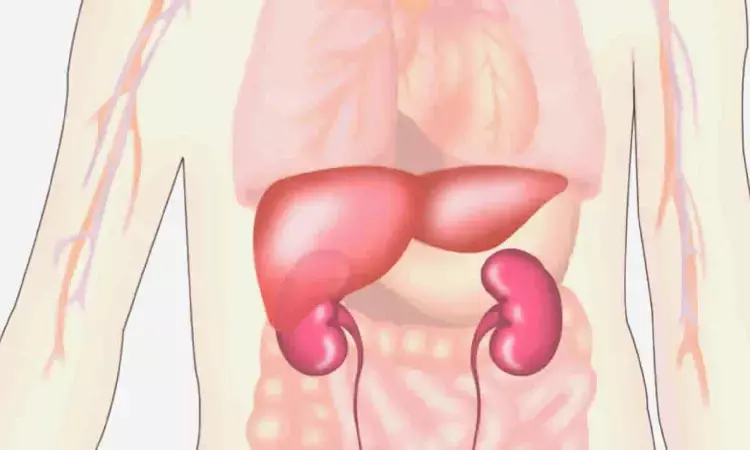- Home
- Medical news & Guidelines
- Anesthesiology
- Cardiology and CTVS
- Critical Care
- Dentistry
- Dermatology
- Diabetes and Endocrinology
- ENT
- Gastroenterology
- Medicine
- Nephrology
- Neurology
- Obstretics-Gynaecology
- Oncology
- Ophthalmology
- Orthopaedics
- Pediatrics-Neonatology
- Psychiatry
- Pulmonology
- Radiology
- Surgery
- Urology
- Laboratory Medicine
- Diet
- Nursing
- Paramedical
- Physiotherapy
- Health news
- Fact Check
- Bone Health Fact Check
- Brain Health Fact Check
- Cancer Related Fact Check
- Child Care Fact Check
- Dental and oral health fact check
- Diabetes and metabolic health fact check
- Diet and Nutrition Fact Check
- Eye and ENT Care Fact Check
- Fitness fact check
- Gut health fact check
- Heart health fact check
- Kidney health fact check
- Medical education fact check
- Men's health fact check
- Respiratory fact check
- Skin and hair care fact check
- Vaccine and Immunization fact check
- Women's health fact check
- AYUSH
- State News
- Andaman and Nicobar Islands
- Andhra Pradesh
- Arunachal Pradesh
- Assam
- Bihar
- Chandigarh
- Chattisgarh
- Dadra and Nagar Haveli
- Daman and Diu
- Delhi
- Goa
- Gujarat
- Haryana
- Himachal Pradesh
- Jammu & Kashmir
- Jharkhand
- Karnataka
- Kerala
- Ladakh
- Lakshadweep
- Madhya Pradesh
- Maharashtra
- Manipur
- Meghalaya
- Mizoram
- Nagaland
- Odisha
- Puducherry
- Punjab
- Rajasthan
- Sikkim
- Tamil Nadu
- Telangana
- Tripura
- Uttar Pradesh
- Uttrakhand
- West Bengal
- Medical Education
- Industry
Hepatic steatosis following Bariatric-metabolic surgery linked to type 2 diabetes remission

Following sleeve gastrectomy (SG) and Roux-en-Y gastric bypass (RYGB), low-grade liver steatosis is linked to type 2 diabetes (T2D) remission, says an article published in Obesity Surgery.
Individuals with extreme obesity and non-alcoholic fatty liver disease (NAFLD) benefit from bariatric-metabolic surgery (BS), which lowers the degree of steatosis, hepatic inflammation, and fibrosis in these patients. In individuals with type 2 diabetes mellitus, non-alcoholic fatty liver disease is present 55.5% of the time. Significant weight reduction and concomitant impacts on glucose homeostasis are the mechanisms. In order to better understand the relationship between NAFLD and type 2 diabetes remission up to 8 years after various forms of BS, Anne Lautenbach and colleagues undertook this study.
The link between biopsy-proven NAFLD, defined as steatosis in > 5% of hepatocytes at the time of surgery, and T2D remission up to 8 years after various surgical procedures was examined in a retrospective cohort study involving 107 individuals with obesity and T2D at baseline. The relationship between NAFLD and the remission of T2D was investigated using univariate regression analysis.
The key findings of this study were:
1. 56% of patients (n = 60) had long-term remission of T2D. Remission of T2D was linked to the existence of grade 1 low-grade liver steatosis.
2. Patients who had baseline greater HbA1c levels had liver steatosis scores below ≥ 2.
3. Between patients who obtained T2D remission and those who did not, there were no appreciable changes in the presence of lobular inflammation, hepatocyte ballooning, or fibrosis at the time of surgery.
4. The kind of surgery had no impact on the T2D remission.
In conclusion, Patients with T2D should consider metabolic surgery, regardless of the kind of surgery, at an early stage of NAFLD. Furthermore, mechanistic research that clarifies the reciprocal link between T2D remission and NAFLD is required.
Reference:
Lautenbach, A., Wernecke, M., Mann, O., Wagner, J., Wolter, S., Stoll, F., & Aberle, J. (2022). Low-grade hepatic steatosis is associated with long-term remission of type 2 diabetes independent of type of bariatric-metabolic surgery. Obesity Surgery. https://doi.org/10.1007/s11695-022-06406-0
Neuroscience Masters graduate
Jacinthlyn Sylvia, a Neuroscience Master's graduate from Chennai has worked extensively in deciphering the neurobiology of cognition and motor control in aging. She also has spread-out exposure to Neurosurgery from her Bachelor’s. She is currently involved in active Neuro-Oncology research. She is an upcoming neuroscientist with a fiery passion for writing. Her news cover at Medical Dialogues feature recent discoveries and updates from the healthcare and biomedical research fields. She can be reached at editorial@medicaldialogues.in
Dr Kamal Kant Kohli-MBBS, DTCD- a chest specialist with more than 30 years of practice and a flair for writing clinical articles, Dr Kamal Kant Kohli joined Medical Dialogues as a Chief Editor of Medical News. Besides writing articles, as an editor, he proofreads and verifies all the medical content published on Medical Dialogues including those coming from journals, studies,medical conferences,guidelines etc. Email: drkohli@medicaldialogues.in. Contact no. 011-43720751


